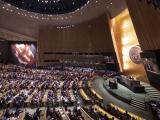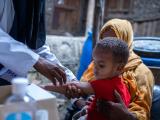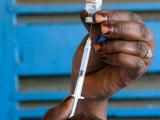May 24, 2011 (CIDRAP News) – After a second round of committee negotiations today, the World Health Assembly (WHA) agreed to postpone setting a date for destruction of the world's remaining smallpox virus stocks for another 3 years.
The assembly simultaneously reaffirmed previous statements that the virus stocks should be destroyed after "crucial research" is completed, the World Health Organization (WHO) said in a press statement. The decision came on the last day of the WHA's annual session.
The WHO statement said the 67th WHA (in 2014) will review the state of variola virus research when it once again takes up the question of a destruction date.
During negotiations yesterday and earlier today, several countries, mainly developing ones, pushed for immediate destruction of the smallpox virus stocks, while others suggested a short delay for setting a deadline.
Approval of the 3-year postponement came at a session of the full WHA in the afternoon.
On May 16 US officials had introduced a resolution to retain the virus stocks for at least another 5 years to allow work on bioterrorism countermeasures to continue. US Secretary of Health and Human Services (HHS) Kathleen Sebelius said, however, that the US was committed to the eventual destruction of the virus stocks.
Nils Daulaire, MD, MPH, director of the HHS Office of Global Affairs, who was in Geneva as part of the US delegation, told CIDRAP News that even though the timeline for revisiting the virus destruction issue is shorter than the US had proposed, the decision was a consensus one that is workable.
"It's a good outcome," he said, adding that 3 more years of countermeasures research and development will allow experts to more precisely assess issues related to destroying the world's remaining stocks.
Daulaire said one stumbling block during the discussions about the draft resolution was Iran's objection to a provision that requires all countries to report if they have any variola stocks and what happened to any they previously had. He said seven other countries spoke in favor if Iran's position.
Twenty seven other countries signed on as cosponsors of the US proposal, Daulaire said, adding that some were from sub-Saharan Africa, an area he says is becoming more concerned about the potential threat of a biological attack and the emergence of other related infectious diseases.
In 1996 the WHA agreed that the remaining virus stocks should be destroyed, but the decision on a timeline has been postponed four other times. The US and Russia have kept supplies of the virus for research purposes, while several developing nations have regularly pushed for the timely destruction of the remaining samples.
Last December an expert group convened by the WHO recommended that researchers and regulators work together to find new ways to test smallpox countermeasures to clear the way for the destruction of the remaining virus stocks. The group based its recommendations on a WHO advisory committee report that reviewed the progress of smallpox research and development. That panel concluded that continued testing of smallpox vaccines and antivirals builds confidence in their efficacy, though it's now possible to create the virus from scratch..
According to a detailed report on the smallpox virus deliberations from the Third World Network (TWN), a nongovernmental organization that observed the proceedings, WHO Director-General Dr Margaret Chan informally helped broker the final agreement today and said she would continue the work of the two WHO groups that released the recommendations and report, if no countries object. The TWN, based in Malaysia, does advocacy work for developing countries.
In other developments today, the full WHA approved an influenza virus-sharing and pandemic preparedness agreement. On May 19 a WHA committee completed its deliberations on the agreement. The pact, a key component of global pandemic preparedness, follows 3 years of efforts by a WHO working group, which delivered a draft agreement to the WHO on Apr 16, just weeks before the WHA convened.
Chan, in her closing speech at the WHA today, called the agreement a historic milestone and proof of the democratic decision-making process the WHO supports.
"This agreed framework is a triumph for health diplomacy, under the superb leadership of chairs and co-chairs, as well as a triumph for public health. It is a tribute to the principles of equity, fairness, and solidarity that underpin everything we try to do at WHO," Chan said.
She said the agreement faced tough odds and negotiators at times appeared to be hopelessly deadlocked. "It vastly improves the world’s capacity to prepare for the next influenza pandemic through better surveillance and risk assessment, and to distribute the benefits of vaccines, antiviral medicines, and diagnostic tests more equitably," Chan said.
See also:
May 24 WHO press release
May 24 Chan closing speech
May 24 TWN report
May 18 CIDRAP News story "Experts: Regulatory issues are main reason for keeping smallpox virus"


















